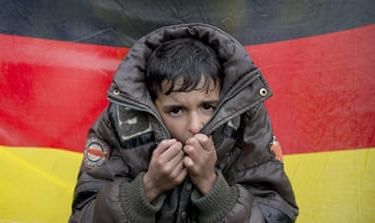Germany revising 2015 refugee figures
The country’s head of migration says Germany took fewer than the previously stated 1.1 million refugees last year.

The head of Germany’s Federal Office for Migration and Refugees told a German newspaper that Germany took in fewer migrants in 2015 than previously thought because some were registered twice and others had moved on to other destinations.
“We’ll present the exact number soon but it’s certain that less than one million people came to Germany last year,” Frank-Juergen Weise told Bild am Sonntag newspaper in comments published on Sunday.
Keep reading
list of 4 itemsPalestinian Prisoner’s Day: How many are still in Israeli detention?
‘Mama we’re dying’: Only able to hear her kids in Gaza in their final days
Europe pledges to boost aid to Sudan on unwelcome war anniversary
|
|
| People and Power – Germany’s Refugee Crisis |
In January, Germany’s interior ministry said that 1.1 million asylum seekers and migrants had entered Europe’s biggest economy in 2015 after fleeing war and poverty in their home countries.
The ministry also said at the time that not all of those people had officially registered and that those deemed “economic migrants” would be deported.
Germans tend to use the word “refugee” to refer to both refugees and migrants who are seeking protection but do not have refugee status.
The exact number of migrant and refugee arrivals in Germany has been the topic of some dispute, with the UN’s refugee agency placing the number of new asylum-seeker applicants in the country at 441,900 for 2015. Some reports, disputed by the government, hinted the the number might even be as high as 1.5 million.
In Sunday’s interview, Weise said he expected a maximum of 300,000 refugees to arrive in Germany this year.
“We’re preparing for 250,000 to 300,000 refugees this year,” he said.
Germans tend to use the word “refugee” to refer to both refugees and migrants who are seeking protection but do not have refugee status.
Weise said that it would take a long time and a lot of money to integrate the newcomers into the labour market.
He said 70 percent of the migrants who had already arrived were fit for employment but added that the majority of them would be dependent on basic social security provision before they manage to get jobs.
He estimated that around 10 percent of the new arrivals had university degrees, while around 40 percent do not have formal vocational training but do have practical work experience, he said.
European nations continue to squabble about whether, and how, to share the newcomers between them and the issues that drove refugees to Europe in the first place – such as Syria’s unrelenting war – are unresolved.
According to the International Organisation for Migration, 2,901 people have died or disappeared crossing the Mediterranean in the first six months of 2016, most along the dangerous central route to Italy – a 37 percent increase over last year’s first half.